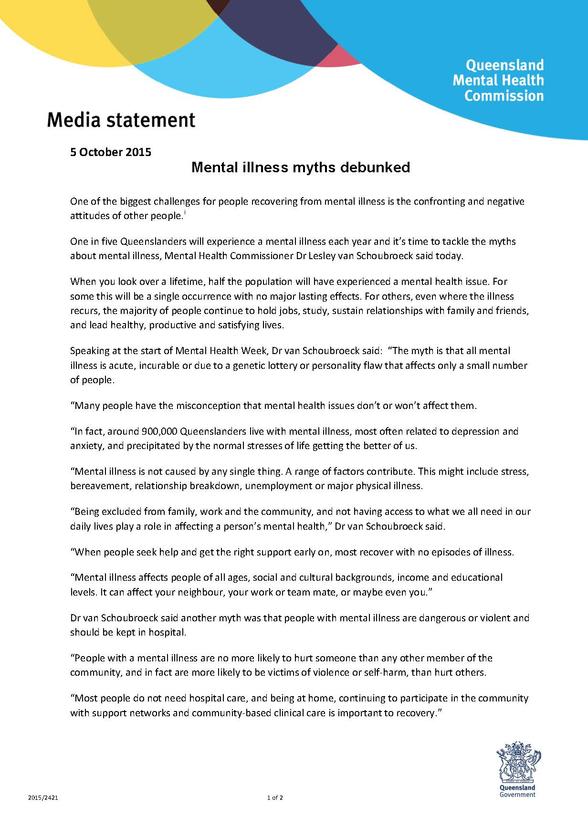One of the biggest challenges for people recovering from mental illness is the confronting and negative attitudes of other people.
One in five Queenslanders will experience a mental illness each year and it’s time to tackle the myths about mental illness, Mental Health Commissioner Dr Lesley van Schoubroeck said today.
When you look over a lifetime, half the population will have experienced a mental health issue. For some this will be a single occurrence with no major lasting effects. For others, even where the illness recurs, the majority of people continue to hold jobs, study, sustain relationships with family and friends, and lead healthy, productive and satisfying lives.
Speaking at the start of Mental Health Week, Dr van Schoubroeck said: “The myth is that all mental illness is acute, incurable or due to a genetic lottery or personality flaw that affects only a small number of people.
“Many people have the misconception that mental health issues don’t or won’t affect them.
“In fact, around 900,000 Queenslanders live with mental illness, most often related to depression and anxiety, and precipitated by the normal stresses of life getting the better of us.
“Mental illness is not caused by any single thing. A range of factors contribute. This might include stress, bereavement, relationship breakdown, unemployment or major physical illness.
“Being excluded from family, work and the community, and not having access to what we all need in our daily lives play a role in affecting a person’s mental health,” Dr van Schoubroeck said.
“When people seek help and get the right support early on, most recover with no episodes of illness.
“Mental illness affects people of all ages, social and cultural backgrounds, income and educational levels. It can affect your neighbour, your work or team mate, or maybe even you.”
Dr van Schoubroeck said another myth was that people with mental illness are dangerous or violent and should be kept in hospital.
“People with a mental illness are no more likely to hurt someone than any other member of the community, and in fact are more likely to be victims of violence or self-harm, than hurt others.
“Most people do not need hospital care, and being at home, continuing to participate in the community with support networks and community-based clinical care is important to recovery.”
Dr van Schoubroeck said: “Some mental illnesses are preventable and their impact can be reduced, particularly if people are tuned-in to the signs of mental illness, and get help early.
“Negative stereotypes, and fear of stigma or discrimination only stop people from seeking help.
“I challenge all Queenslanders to think about how well they are looking after their own mental health and wellbeing, debunk the negative stereotypes and adopt a more positive attitude to people with mental illness.”
The Mental illness myths debunked media release is available to read online.
Media contact: Kate Southwell, (07) 3405 0718 or 0409 275 385
Sourced from the Australian Department of Health and the Mental Health Commission of Western Australia
-
 Mental illness myths debunked (PDF, 226.83 KB)
Mental illness myths debunked (PDF, 226.83 KB)

